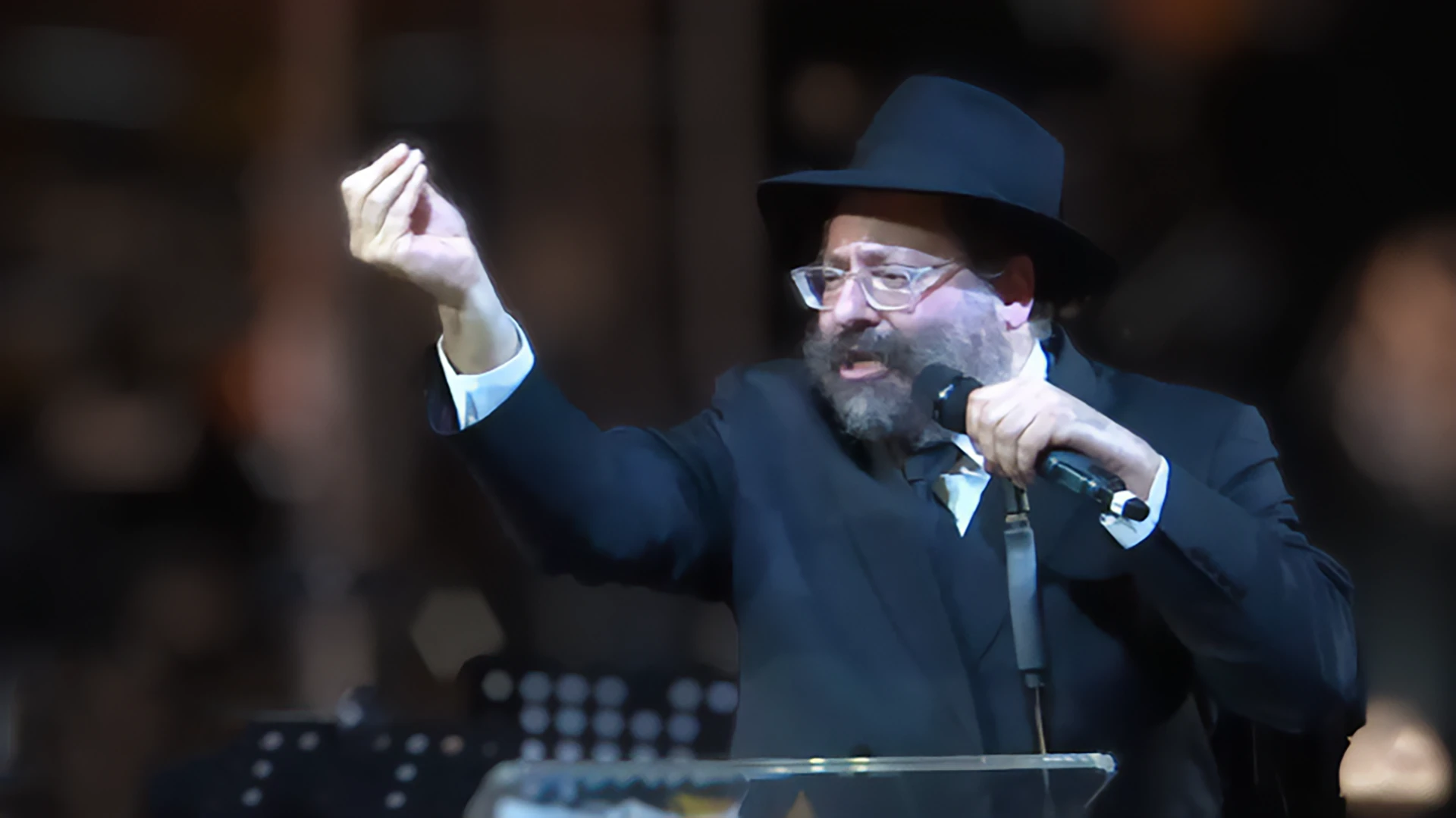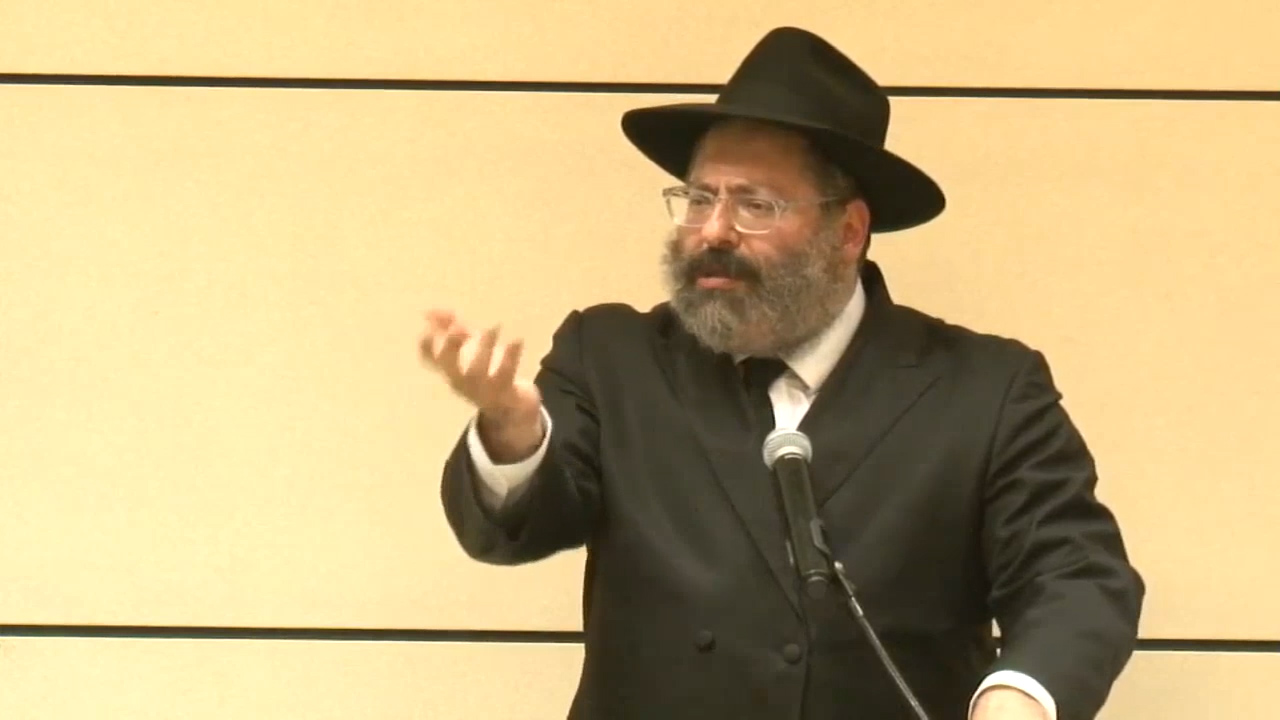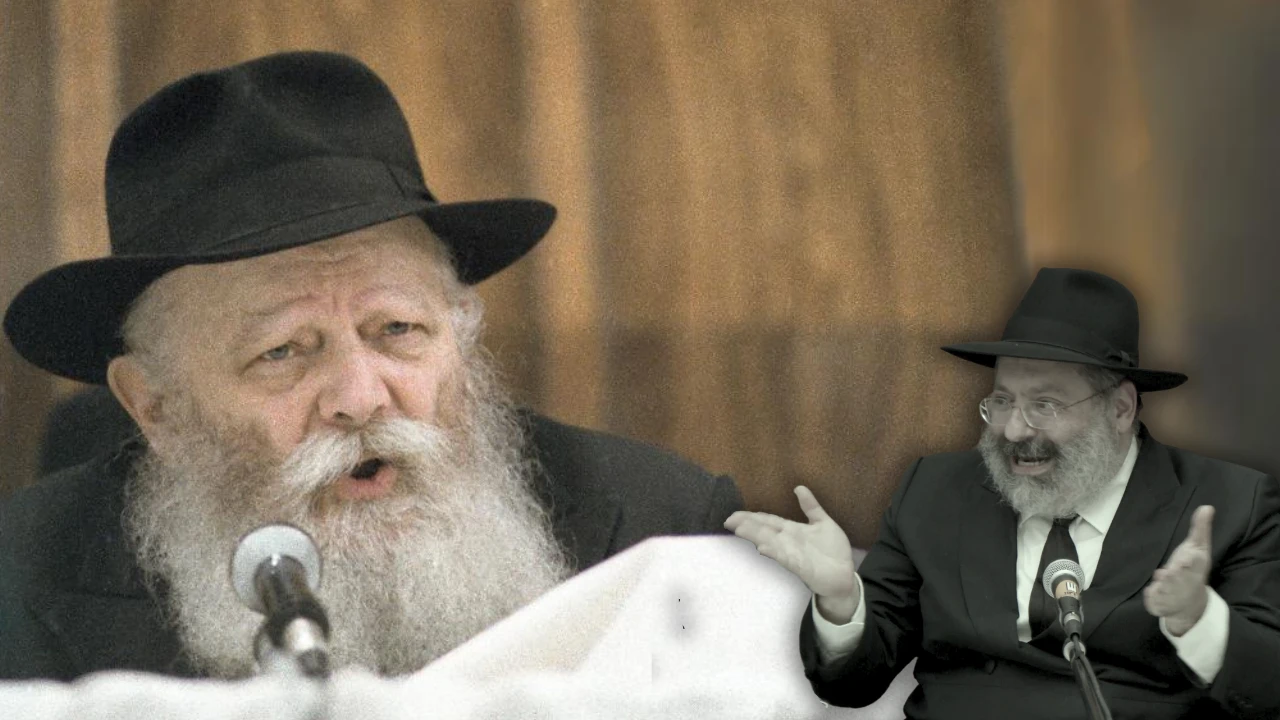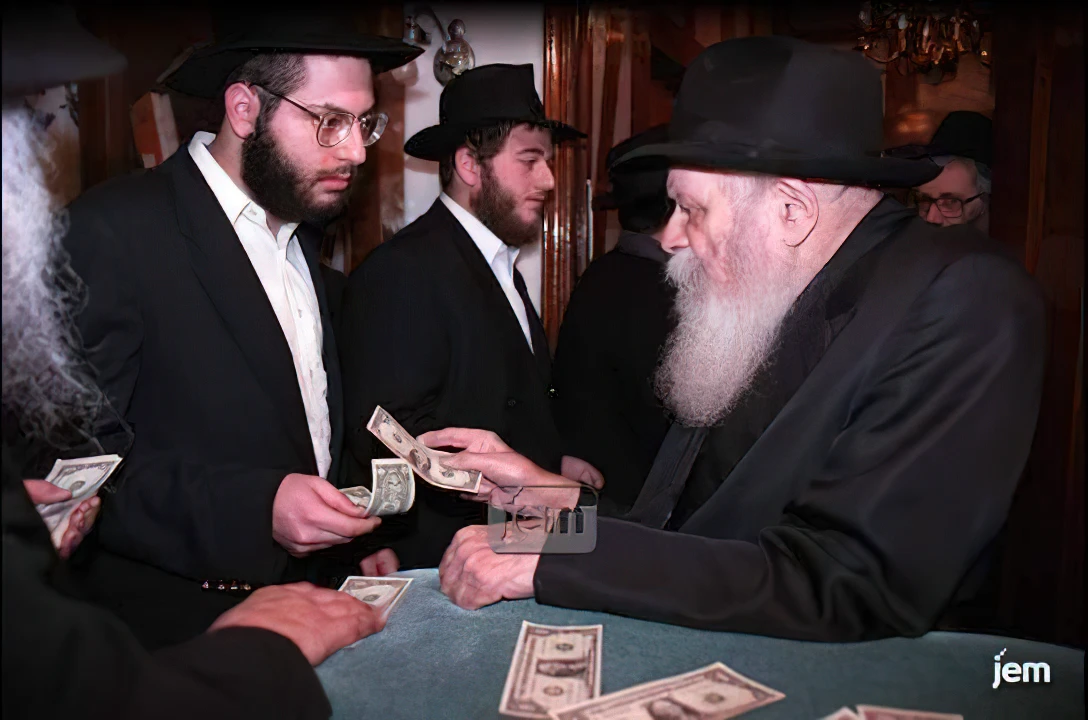The Shame & Cluelessness of Some in Our Community
Shema Yisroel -- The Infinite Value of Life
- April 30, 2020
- |
- 6 Iyyar 5780
Rabbi YY Jacobson
2328 views
A poster in Israel reads: "The angel of death is in the street; return home!" The poster shows a photo of a NY funeral of a man who died from coronavirus.

The Shame & Cluelessness of Some in Our Community
Shema Yisroel -- The Infinite Value of Life
Rabbi YY Jacobson
- April 30, 2020
Business versus pleasure
Izzy owned a small deli in Stamford Hill, in London. One day, a tax inspector knocked on his door and questioned him about his recent tax return. Izzy had reported a net profit of $250.000 for the year and he wanted to know all about it. "It’s like this," said Izzy. "I work like a maniac all year round and all of my family helps me out whenever they can. My deli is closed only five days a year. That’s how I made $250,000."
"It's not your income that bothers us," said the taxman. "It's the business travel deductions of $80,000 that worries us. You entered on the tax return that you and your wife made 28 business trips to Israel, Italy, Switzerland, France, the US, Hawaii, and the Caribbean Islands. What are all these business trips about?"
"Oh," said Izzy, smiling. "I forgot to tell you that we also deliver!"
Live by Them
It is a simple verse in this week’s portion, but it came to represent an extraordinary truth about Judaism—one so relevant to the present coronavirus crisis.
אחרי יח, ה: וּשְׁמַרְתֶּם אֶת חֻקֹּתַי וְאֶת מִשְׁפָּטַי אֲשֶׁר יַעֲשֶׂה אֹתָם הָאָדָם וָחַי בָּהֶם אֲנִי יְהוָֹה:
You shall observe My statutes and My ordinances, which a man shall do and live by them. I am the Lord.
As the Talmud puts it: “You shall live by them—and not die by them.”[1]
This verse, “and he shall live by them,” is one of seven biblical which the Talmud cites as proof that one may violate the Shabbat to save a life. “To live by them”—“and not to die by them.”[2]
If a mitzvah might cause death, even if there is the slightest chance it may, G-d does not want the mitzvah. This is the rule in Jewish law: We must violate every mitzvah in order to save life. That’s why it is forbidden today to gather to pray, study and celebrate milestones, or to shop for Shabbos without physical distancing. These sacred mitzvot can cause death. The High Priest may be standing in the Holy of Holies on the most sacred day of the year, Yom Kippur, in communion with the Divine. If he hears that there is an infant in danger, he must throw everything away, run out of the sacred space and go try and save the baby! From eating pork to cooking on Shabbos, from drinking on Yom Kippur to eating pizza on Passover, from canceling circumcision to swearing falsely—most sins become obligatory if as a result a life might be saved.
The Chasam Sofer’s Insight
To appreciate the significance of this, Rabbi Moshe Sofer, known as the Chasam Sofer, presents a marvelous interpretation to another verse in Exodus, one of the seven verses recited in the Talmud as a proof that saving life overrides Shabbos.[3]
The context of this verse is somewhat strange. G-d tells Moses that he has conferred upon Bezalel the prowess and wisdom to be able to construct the Sanctuary, which was nuanced, exquisite and dazzling in its brilliance and craftsmanship. Right after that, comes this verse:
כי תשא לא, יג: וְאַתָּה דַּבֵּר אֶל בְּנֵי יִשְׂרָאֵל לֵאמֹר אַךְ אֶת שַׁבְּתֹתַי תִּשְׁמֹרוּ כִּי אוֹת הִוא בֵּינִי וּבֵינֵיכֶם לְדֹרֹתֵיכֶם לָדַעַת כִּי אֲנִי יְהֹוָה מְקַדִּשְׁכֶם:
And you, speak to the children of Israel and say: 'Only keep My Sabbaths! For it is a sign between Me and you for your generations, to know that I, the Lord, make you holy.
What’s the juxtaposition between the two topics? Rashi says: “Although I have mandated you to command them [the Israelites] concerning the work of the Mishkan, do not let it seem to you that you may easily set aside the Sabbath because of that work. Although you will be rushed to perform the work [of the Mishkan] quickly, the Sabbath shall not be set aside because of it. All instances where it says “only” (ach), imply limitations, i.e., they are exclusive, to exclude the Sabbath from the work of the Mishkan. On the Shabbat, the Jews needed to cease all work on the Sanctuary.
But what does the verse mean when it says, “For it is a sign between Me and you for your generations, to know that I, the Lord, make you holy.” How is it through the Shabbat we get to know that we are holy?
The Chasam Sofer offers this insight.
The Greatest Project
What was the greatest project ever undertaken? No question, it was the building of the cosmos. After all, that is the mother of any other project, big or small, undertaken by man or by nature. Our observable universe is a sphere around 92 billion light-years. We know of roughly octillion—1 followed by 24 zeros—planets in the universe. The human body alone contains some 100 trillion cells. Within each cell is a nucleus. Within each nucleus is a double copy of the human genome. Each genome contains 3.1 billion letters of genetic code, enough if transcribed to fill a library of five thousand books. The greatest miracle of all time, without any close seconds, is the universe. It is the miracle of all miracles.
And yet, the Torah teaches there is something even greater than the universe.
What?
In the beginning of Genesis, the Torah devotes 31 verses to describe how G-d created the entire world. “In the beginning G-d created the heavens and the earth.” In striking contrast, the Torah devotes 371 verses to describe how the Jews created the Tabernacle, or Mishkan, in the desert!
This seems profoundly strange. The universe spans some 176 Trillion Billion miles and is an infinitely complex structure. After millennia of research, we have not yet scratched the surface of its untold depth and unbound mysteries. We have not even mastered the secrets embedded in a single cell. The Tabernacle, on the other hand, was around 150 feet long and 75 feet wide, and was an impressive structure, but essentially a small tent; a mini mobile "shteibel."
Why would the Torah be so expansive about the creation of a humble albeit splendorous tent in the desert and yet so terse about the creation of the cosmos with its infinite depth, majesty and grandeur? Does it make sense?
The answer is that the universe is the home G-d makes for man. While the Sanctuary is the home man makes for G-d. It may be smaller and simpler, but still more significant and prominent.
Or in the words of the Midrash:
מכילתא ורש"י פרשת בשלח: חביב בית המקדש לפני הקב"ה, שכשברא הקב"ה את עולמו לא בראו אלא בידו אחת שנאמר אף ידי יסדה ארץ, וכשבא לבנות בית המקדש כביכול בשתי ידיו שנאמר מקדש ה' כוננו ידיך.
Concerning the universe, the Torah states: “My hand founded earth,” where is with the Holy Temple the Torah states, “your hands established G-d’s Temple,” not one hand but two hands. The universe was created, so to speak, with a single hand; the Temple—with both hands.
And yet, there is something even greater than the Sanctuary. Even the construction of the Sanctuary had to be suspended for something. For what?
The Shabbat! Even to construct the Sanctuary, we may not desecrate the Shabbat. The sanctity and preciousness of Shabbat trumps the Sanctuary, which trumps the universe. This tells us something about the infinite greatness of Shabbat. For even the Sanctuary, which serves a G-d home on earth, is not as holy as Shabbat—the day of “rest,” which transcends the entire creation, the entire universe, even G-d’s “home” in our world. Shabbos is a day of intimacy with the Divine beyond the world, with G-d Himself.
But wait, there is something even holier than Shabbat! And for that even Shabbos itself needs to be shattered and destroyed.
What is that? The Jew! The Shabbat must be violated to save a life. Even if there exists only one percent chance that a life might be saved by violating the Shabbat, and to just prolong a life by a few minutes, all the laws of Shabbat must be broken. For the sanctity of life trumps even the sanctity of Shabbat, which trumps even the sanctity of the Temple, which trumps the very act of creation—the origin of all existence.
The Shema
This, says the Chasam Sofer, is the meaning of the words “Shema Yisroel Hashem…” Shema consists of three letters, which are the acronym of “Shabbos, Mikdash, Olam.”
שמע—שבת, מקדש, עולם.
The Shabbat, the Temple, and the world. These are in descending order the three most precious items of existence.
And yet above all three of them is (Shema) Yisroel—the Jew himself! For the Jew is literally one with G-d in His very essence, Yisroel is part of “Hashem Elokanu Hashem Echad.”
This, then, is the meaning of the verse:
“And you, speak to the children of Israel and say: 'Only keep My Sabbaths! For it is a sign between Me and you for your generations, to know that I, the Lord, make you holy.” This verse teaches us that Shabbos trumps the construction of the Sanctuary. And this itself brings out in the most potent way the holiness of Israel—for even Shabbos cannot interfere in saving a Jewish life. “To know that I, the Lord, make you holy.” The sanctuary is holy, the Shabbat is holy, but the deepest holiness and sanctity lay in “you,” in the Jewish person. Your existence and life embody the profoundest Divine holiness, beyond the universe, beyond the Beit Hamikdash, and even beyond Shabbos.
The Final Journey
A family in Israel had a teenage son struck with a terminal illness. This was a learned yeshiva student whose youth was robbed by this devastating illness. The end seemed near, and the boy had shut everyone out of what was left of his life. He lay there with his eyes open, staring at the ceiling, in deep despair. He knew and understood what was occurring. The doctors were concealing nothing from him. He had given up hope and lay there waiting to die. All that his parents wanted was a simple conversation, to talk to him, to say goodbye. He was their child, and they loved him. Why should his last moments be spent alone?
They asked the late Rabbi Ezriel Tauber, to visit him and try to infuse their son with "life," albeit it temporarily.
Arriving at the hospital room, Rabbi Tauber was not prepared for what he saw. As much as he had attempted to envision the boy, he was ill-prepared for the image which confronted him. The boy was a mass of skin and bones, his face contorted in agony, his eyes staring out into space. Next to his bed sat his mother, whose tear-stained face told the entire story. Amidst her weeping, she would whisper to her son, "Do you need anything?” There was no response - just staring.
Rabbi Tauber turned to the boy and quietly said, "Shalom Aleichem." No response—only continued staring. Again, Rabbi Tauber said, "Shalom Aleichem." Same response, nothing. This continued two more times until, finally, Rabbi Tauber said, "I came quite a distance to see you. It was not easy. The least you could do is answer me."
Suddenly, he saw a glimmer of movement from the boy's eyes. It was not much of a response, but it was certainly much more than he had been receiving earlier.
"Let me ask you a question," Rabbi Tauber began. "You are a yeshivah student, and I am sure that you have studied Talmud and Jewish law. Perhaps you can clarify some law for me." If a thief approaches a Jew and demands that he handover all his money unless he transgresses a prohibition of the Torah. If he eats pork, he can keep his money; if not, he wants all the money. If the Jew cannot escape or fight off the gangster, what should he do?"
Slowly the boy's lips began to move, as he forced himself to speak. "He gives up his money, but no mitzvah of the Torah may be transgressed."
The rabbi continued: "Perhaps this applies only to one who either does not have much to lose or who lives alone and has no one other than himself to support. Let us look at the example of a wealthy man who supports a multitude of organizations and people. In fact, hundreds of families rely on him for sustenance. Will this ruling still apply? Should he be forced to relinquish all of his funds, thereby jeopardizing the livelihood of many people, rather than transgress a prohibition of the Torah?"
"Yes," the boy replied emphatically. "The ruling is in place regardless of the consequences. A Torah law may not be transgressed even if it costs one all the money. Your relationship to G-d is priceless; it is worth more than all the money."
רמ"א אורח חיים סימן תרנו: ומי שאין לו אתרוג או שאר מצוה עוברת אין צריך לבזבז עליהם הון רב וכמו שאמרו המבזבז אל יבזבז יותר מחומש אפילו מצוה עוברת (הרא"ש ורבינו ירוחם נתיב י"ג חלק ב'). ודווקא מצות עשה אבל לא תעשה יתן כל ממונו קודם שיעבור (הרשב"א וראב"ד).
The Rabbi continues: "What would be the law if, rather than having one's wealth threatened, it was his life that hung in the balance? Say the gangster says, I will kill you if you do not eat pork?”
"In such a case, human life takes precedence. Under no circumstances may one's life be put in danger (except for the three cardinal sins of murder, idolatry and adultery). G-d wants us to live through the mitzvos, not die through them," was the boy's response.
"Let us say that in this instance, it does not involve merely one person transgressing a sin, but that of many Jews. Say, to save a life, an entire city of Jews needs to violate Shabbos. Will the law safeguarding human life still prevail?" asked Rabbi Tauber.
The boy responded, "It holds true under all conditions. Human life is sacrosanct. It takes precedence over all prohibitions."
The boy was getting into it; he was appreciating the challenge. "For instance, if the Shabbos desecration was a surety, but the chance of saving life was, at best, doubtful, will life still prevail?" asked Rabbi Tauber.
"Yes," said the boy. "Even the slightest doubt that affects human life renders it more important than any prohibition," he replied.
"Tell me, my young scholar," Rabbi Tauber continued, "What is the law in a situation where someone lies deathly ill; indeed, there is no hope for him to live more than a short time. How about for him, are we to desecrate Shabbos just that his life be extended, for a few hours?"
The boy was no fool. He smiled. He got the message.
If I own 40 billion dollars, I must be ready to give it all up so as not to violate Shabbos! Shabbos trumps 40 billion. And yet to extend a life for a few minutes, I have to give up all of Shabbos! What does this tell us? That life is G-d's greatest gift, and every moment of is holy beyond holy, transcending every other holiness. One must desecrate Shabbos to keep the patient alive—even for a short time. We may not fathom the significance of life, yet the entire Torah is pushed aside to save a moment of life.
Rabbi Tauber bent down and kissed the boy on his forehead. As he parted from him, he said: "It is no secret that you are undergoing indescribable pain. I am so sorry. I will never understand why. But do not give up. The flow of life that still courses through your veins is something of infinite value. No human mind can fathom how special and precious it is. G-d is willing to have His holy Shabbos desecrated even for the slightest chance, albeit doubtful, of sustaining a life. As long as you are alive, embrace that gift with love."
The boy gave a weak smile. The rabbi went on his way.
A few days later, the boy passed from this world. When Rabbi Tauber visited the family during the shivah, the seven-day mourning period, the mother told him, "From the time that you spoke with my son, until the bitter end, he was a different person. He was no longer just lying there waiting for the Angel of Death, to come and take him. He spoke; we spoke; he communicated. We said good-bye.” The mother could not thank him enough for what he has done.
A Sacred Opportunity
On 7 Tishrei, 5752 (September 15, 1991), Fred Chernowski visited the Lubavitcher Rebbe. His dilemma: his father was 84 years old, with dying brain cells, and immobile. He craved to go to shul and be part of the community but was home-ridden. His father was depressed and downtrodden. What could he do for his father?
The Rebbe said something very powerful.[4]
Explain to your father, that every single Jew has a mission from G-d, which he fulfilled through doing a mitzvah. When a Jew does a mitzvah in this world, he is fulfilling G-d mission and he is, so to speak, doing a favor to G-d. Tell your father that every mitzvah he performs, is a gift he is giving to G-d. How can he give up such a mission and opportunity?
Even bestowing upon him all the good things in the world does not match up to this awesome truth that he can, right now in his present situation, do a favor for G-d. And how? By putting on tefilin, by giving charity, or any other mitzvah.
[1] Yuma 85b
[2] Yuma 85a-b
[3] Chasam Sofer to Exodus 31:13. He was one of the most illustrious Rabbis of the 18th and 19th century (1762–1839), known by his main work Chasam Sofer (translated “Seal of the Scribe” and acronym for “Chiddushei Toras Moshe Sofer”). He was the Rabbi of the city of Pressburg, today Bratislava, in the Austrian Empire. The Chasam Sofer’s published works include more than a thousand responsa, a commentary on the Torah titled “Toras Moshe,” a commentary on the Talmud, and religious poetry. The wording of the Chasam Sofer about the holiness of a Jew and how he is one with G-d Himself, seems almost straight out of the Chassidic works.
[4] What follows is almost verbatim:
http://www.chabad.org/therebbe/livingtorah/player_cdo/aid/818259/jewish/Every-Mitzvah-is-Precious.htm- Comment
Class Summary:
Shema Yisroel -- The Infinite Value of Life.
It is a simple verse in this week’s portion, but it came to represent an extraordinary truth about Judaism. “You shall observe My statutes and My ordinances, which a man shall do and live by them. I am the Lord.” As the Talmud puts it: “You shall live by them—and not die by them.”
The significance of this cannot be underestimated. For many religions, to this very day, G-d equals a fascination and obsession with death. Islamists killers blow themselves up and declare “Allah Achbar,” G-d is great! G-d, for them, is found in death. To die a martyr while killing infidels is a sacred goal.
But it is the Chasam Sofer who offers a most novel insight into the holiness of life that emerges from this verse.
The story of the teen-age boy who came back to life after the visit of the Rabbi, and the message the Lubavitcher Rebbe sent to a depressed, old, sick and immobile Jew—grant perspective on the unfathomable dignity the Torah attributes to a single life.
Dedicated to the Hatzalah members on the front lines of saving lives
Business versus pleasure
Izzy owned a small deli in Stamford Hill, in London. One day, a tax inspector knocked on his door and questioned him about his recent tax return. Izzy had reported a net profit of $250.000 for the year and he wanted to know all about it. "It’s like this," said Izzy. "I work like a maniac all year round and all of my family helps me out whenever they can. My deli is closed only five days a year. That’s how I made $250,000."
"It's not your income that bothers us," said the taxman. "It's the business travel deductions of $80,000 that worries us. You entered on the tax return that you and your wife made 28 business trips to Israel, Italy, Switzerland, France, the US, Hawaii, and the Caribbean Islands. What are all these business trips about?"
"Oh," said Izzy, smiling. "I forgot to tell you that we also deliver!"
Live by Them
It is a simple verse in this week’s portion, but it came to represent an extraordinary truth about Judaism—one so relevant to the present coronavirus crisis.
אחרי יח, ה: וּשְׁמַרְתֶּם אֶת חֻקֹּתַי וְאֶת מִשְׁפָּטַי אֲשֶׁר יַעֲשֶׂה אֹתָם הָאָדָם וָחַי בָּהֶם אֲנִי יְהוָֹה:
You shall observe My statutes and My ordinances, which a man shall do and live by them. I am the Lord.
As the Talmud puts it: “You shall live by them—and not die by them.”[1]
This verse, “and he shall live by them,” is one of seven biblical which the Talmud cites as proof that one may violate the Shabbat to save a life. “To live by them”—“and not to die by them.”[2]
If a mitzvah might cause death, even if there is the slightest chance it may, G-d does not want the mitzvah. This is the rule in Jewish law: We must violate every mitzvah in order to save life. That’s why it is forbidden today to gather to pray, study and celebrate milestones, or to shop for Shabbos without physical distancing. These sacred mitzvot can cause death. The High Priest may be standing in the Holy of Holies on the most sacred day of the year, Yom Kippur, in communion with the Divine. If he hears that there is an infant in danger, he must throw everything away, run out of the sacred space and go try and save the baby! From eating pork to cooking on Shabbos, from drinking on Yom Kippur to eating pizza on Passover, from canceling circumcision to swearing falsely—most sins become obligatory if as a result a life might be saved.
The Chasam Sofer’s Insight
To appreciate the significance of this, Rabbi Moshe Sofer, known as the Chasam Sofer, presents a marvelous interpretation to another verse in Exodus, one of the seven verses recited in the Talmud as a proof that saving life overrides Shabbos.[3]
The context of this verse is somewhat strange. G-d tells Moses that he has conferred upon Bezalel the prowess and wisdom to be able to construct the Sanctuary, which was nuanced, exquisite and dazzling in its brilliance and craftsmanship. Right after that, comes this verse:
כי תשא לא, יג: וְאַתָּה דַּבֵּר אֶל בְּנֵי יִשְׂרָאֵל לֵאמֹר אַךְ אֶת שַׁבְּתֹתַי תִּשְׁמֹרוּ כִּי אוֹת הִוא בֵּינִי וּבֵינֵיכֶם לְדֹרֹתֵיכֶם לָדַעַת כִּי אֲנִי יְהֹוָה מְקַדִּשְׁכֶם:
And you, speak to the children of Israel and say: 'Only keep My Sabbaths! For it is a sign between Me and you for your generations, to know that I, the Lord, make you holy.
What’s the juxtaposition between the two topics? Rashi says: “Although I have mandated you to command them [the Israelites] concerning the work of the Mishkan, do not let it seem to you that you may easily set aside the Sabbath because of that work. Although you will be rushed to perform the work [of the Mishkan] quickly, the Sabbath shall not be set aside because of it. All instances where it says “only” (ach), imply limitations, i.e., they are exclusive, to exclude the Sabbath from the work of the Mishkan. On the Shabbat, the Jews needed to cease all work on the Sanctuary.
But what does the verse mean when it says, “For it is a sign between Me and you for your generations, to know that I, the Lord, make you holy.” How is it through the Shabbat we get to know that we are holy?
The Chasam Sofer offers this insight.
The Greatest Project
What was the greatest project ever undertaken? No question, it was the building of the cosmos. After all, that is the mother of any other project, big or small, undertaken by man or by nature. Our observable universe is a sphere around 92 billion light-years. We know of roughly octillion—1 followed by 24 zeros—planets in the universe. The human body alone contains some 100 trillion cells. Within each cell is a nucleus. Within each nucleus is a double copy of the human genome. Each genome contains 3.1 billion letters of genetic code, enough if transcribed to fill a library of five thousand books. The greatest miracle of all time, without any close seconds, is the universe. It is the miracle of all miracles.
And yet, the Torah teaches there is something even greater than the universe.
What?
In the beginning of Genesis, the Torah devotes 31 verses to describe how G-d created the entire world. “In the beginning G-d created the heavens and the earth.” In striking contrast, the Torah devotes 371 verses to describe how the Jews created the Tabernacle, or Mishkan, in the desert!
This seems profoundly strange. The universe spans some 176 Trillion Billion miles and is an infinitely complex structure. After millennia of research, we have not yet scratched the surface of its untold depth and unbound mysteries. We have not even mastered the secrets embedded in a single cell. The Tabernacle, on the other hand, was around 150 feet long and 75 feet wide, and was an impressive structure, but essentially a small tent; a mini mobile "shteibel."
Why would the Torah be so expansive about the creation of a humble albeit splendorous tent in the desert and yet so terse about the creation of the cosmos with its infinite depth, majesty and grandeur? Does it make sense?
The answer is that the universe is the home G-d makes for man. While the Sanctuary is the home man makes for G-d. It may be smaller and simpler, but still more significant and prominent.
Or in the words of the Midrash:
מכילתא ורש"י פרשת בשלח: חביב בית המקדש לפני הקב"ה, שכשברא הקב"ה את עולמו לא בראו אלא בידו אחת שנאמר אף ידי יסדה ארץ, וכשבא לבנות בית המקדש כביכול בשתי ידיו שנאמר מקדש ה' כוננו ידיך.
Concerning the universe, the Torah states: “My hand founded earth,” where is with the Holy Temple the Torah states, “your hands established G-d’s Temple,” not one hand but two hands. The universe was created, so to speak, with a single hand; the Temple—with both hands.
And yet, there is something even greater than the Sanctuary. Even the construction of the Sanctuary had to be suspended for something. For what?
The Shabbat! Even to construct the Sanctuary, we may not desecrate the Shabbat. The sanctity and preciousness of Shabbat trumps the Sanctuary, which trumps the universe. This tells us something about the infinite greatness of Shabbat. For even the Sanctuary, which serves a G-d home on earth, is not as holy as Shabbat—the day of “rest,” which transcends the entire creation, the entire universe, even G-d’s “home” in our world. Shabbos is a day of intimacy with the Divine beyond the world, with G-d Himself.
But wait, there is something even holier than Shabbat! And for that even Shabbos itself needs to be shattered and destroyed.
What is that? The Jew! The Shabbat must be violated to save a life. Even if there exists only one percent chance that a life might be saved by violating the Shabbat, and to just prolong a life by a few minutes, all the laws of Shabbat must be broken. For the sanctity of life trumps even the sanctity of Shabbat, which trumps even the sanctity of the Temple, which trumps the very act of creation—the origin of all existence.
The Shema
This, says the Chasam Sofer, is the meaning of the words “Shema Yisroel Hashem…” Shema consists of three letters, which are the acronym of “Shabbos, Mikdash, Olam.”
שמע—שבת, מקדש, עולם.
The Shabbat, the Temple, and the world. These are in descending order the three most precious items of existence.
And yet above all three of them is (Shema) Yisroel—the Jew himself! For the Jew is literally one with G-d in His very essence, Yisroel is part of “Hashem Elokanu Hashem Echad.”
This, then, is the meaning of the verse:
“And you, speak to the children of Israel and say: 'Only keep My Sabbaths! For it is a sign between Me and you for your generations, to know that I, the Lord, make you holy.” This verse teaches us that Shabbos trumps the construction of the Sanctuary. And this itself brings out in the most potent way the holiness of Israel—for even Shabbos cannot interfere in saving a Jewish life. “To know that I, the Lord, make you holy.” The sanctuary is holy, the Shabbat is holy, but the deepest holiness and sanctity lay in “you,” in the Jewish person. Your existence and life embody the profoundest Divine holiness, beyond the universe, beyond the Beit Hamikdash, and even beyond Shabbos.
The Final Journey
A family in Israel had a teenage son struck with a terminal illness. This was a learned yeshiva student whose youth was robbed by this devastating illness. The end seemed near, and the boy had shut everyone out of what was left of his life. He lay there with his eyes open, staring at the ceiling, in deep despair. He knew and understood what was occurring. The doctors were concealing nothing from him. He had given up hope and lay there waiting to die. All that his parents wanted was a simple conversation, to talk to him, to say goodbye. He was their child, and they loved him. Why should his last moments be spent alone?
They asked the late Rabbi Ezriel Tauber, to visit him and try to infuse their son with "life," albeit it temporarily.
Arriving at the hospital room, Rabbi Tauber was not prepared for what he saw. As much as he had attempted to envision the boy, he was ill-prepared for the image which confronted him. The boy was a mass of skin and bones, his face contorted in agony, his eyes staring out into space. Next to his bed sat his mother, whose tear-stained face told the entire story. Amidst her weeping, she would whisper to her son, "Do you need anything?” There was no response - just staring.
Rabbi Tauber turned to the boy and quietly said, "Shalom Aleichem." No response—only continued staring. Again, Rabbi Tauber said, "Shalom Aleichem." Same response, nothing. This continued two more times until, finally, Rabbi Tauber said, "I came quite a distance to see you. It was not easy. The least you could do is answer me."
Suddenly, he saw a glimmer of movement from the boy's eyes. It was not much of a response, but it was certainly much more than he had been receiving earlier.
"Let me ask you a question," Rabbi Tauber began. "You are a yeshivah student, and I am sure that you have studied Talmud and Jewish law. Perhaps you can clarify some law for me." If a thief approaches a Jew and demands that he handover all his money unless he transgresses a prohibition of the Torah. If he eats pork, he can keep his money; if not, he wants all the money. If the Jew cannot escape or fight off the gangster, what should he do?"
Slowly the boy's lips began to move, as he forced himself to speak. "He gives up his money, but no mitzvah of the Torah may be transgressed."
The rabbi continued: "Perhaps this applies only to one who either does not have much to lose or who lives alone and has no one other than himself to support. Let us look at the example of a wealthy man who supports a multitude of organizations and people. In fact, hundreds of families rely on him for sustenance. Will this ruling still apply? Should he be forced to relinquish all of his funds, thereby jeopardizing the livelihood of many people, rather than transgress a prohibition of the Torah?"
"Yes," the boy replied emphatically. "The ruling is in place regardless of the consequences. A Torah law may not be transgressed even if it costs one all the money. Your relationship to G-d is priceless; it is worth more than all the money."
רמ"א אורח חיים סימן תרנו: ומי שאין לו אתרוג או שאר מצוה עוברת אין צריך לבזבז עליהם הון רב וכמו שאמרו המבזבז אל יבזבז יותר מחומש אפילו מצוה עוברת (הרא"ש ורבינו ירוחם נתיב י"ג חלק ב'). ודווקא מצות עשה אבל לא תעשה יתן כל ממונו קודם שיעבור (הרשב"א וראב"ד).
The Rabbi continues: "What would be the law if, rather than having one's wealth threatened, it was his life that hung in the balance? Say the gangster says, I will kill you if you do not eat pork?”
"In such a case, human life takes precedence. Under no circumstances may one's life be put in danger (except for the three cardinal sins of murder, idolatry and adultery). G-d wants us to live through the mitzvos, not die through them," was the boy's response.
"Let us say that in this instance, it does not involve merely one person transgressing a sin, but that of many Jews. Say, to save a life, an entire city of Jews needs to violate Shabbos. Will the law safeguarding human life still prevail?" asked Rabbi Tauber.
The boy responded, "It holds true under all conditions. Human life is sacrosanct. It takes precedence over all prohibitions."
The boy was getting into it; he was appreciating the challenge. "For instance, if the Shabbos desecration was a surety, but the chance of saving life was, at best, doubtful, will life still prevail?" asked Rabbi Tauber.
"Yes," said the boy. "Even the slightest doubt that affects human life renders it more important than any prohibition," he replied.
"Tell me, my young scholar," Rabbi Tauber continued, "What is the law in a situation where someone lies deathly ill; indeed, there is no hope for him to live more than a short time. How about for him, are we to desecrate Shabbos just that his life be extended, for a few hours?"
The boy was no fool. He smiled. He got the message.
If I own 40 billion dollars, I must be ready to give it all up so as not to violate Shabbos! Shabbos trumps 40 billion. And yet to extend a life for a few minutes, I have to give up all of Shabbos! What does this tell us? That life is G-d's greatest gift, and every moment of is holy beyond holy, transcending every other holiness. One must desecrate Shabbos to keep the patient alive—even for a short time. We may not fathom the significance of life, yet the entire Torah is pushed aside to save a moment of life.
Rabbi Tauber bent down and kissed the boy on his forehead. As he parted from him, he said: "It is no secret that you are undergoing indescribable pain. I am so sorry. I will never understand why. But do not give up. The flow of life that still courses through your veins is something of infinite value. No human mind can fathom how special and precious it is. G-d is willing to have His holy Shabbos desecrated even for the slightest chance, albeit doubtful, of sustaining a life. As long as you are alive, embrace that gift with love."
The boy gave a weak smile. The rabbi went on his way.
A few days later, the boy passed from this world. When Rabbi Tauber visited the family during the shivah, the seven-day mourning period, the mother told him, "From the time that you spoke with my son, until the bitter end, he was a different person. He was no longer just lying there waiting for the Angel of Death, to come and take him. He spoke; we spoke; he communicated. We said good-bye.” The mother could not thank him enough for what he has done.
A Sacred Opportunity
On 7 Tishrei, 5752 (September 15, 1991), Fred Chernowski visited the Lubavitcher Rebbe. His dilemma: his father was 84 years old, with dying brain cells, and immobile. He craved to go to shul and be part of the community but was home-ridden. His father was depressed and downtrodden. What could he do for his father?
The Rebbe said something very powerful.[4]
Explain to your father, that every single Jew has a mission from G-d, which he fulfilled through doing a mitzvah. When a Jew does a mitzvah in this world, he is fulfilling G-d mission and he is, so to speak, doing a favor to G-d. Tell your father that every mitzvah he performs, is a gift he is giving to G-d. How can he give up such a mission and opportunity?
Even bestowing upon him all the good things in the world does not match up to this awesome truth that he can, right now in his present situation, do a favor for G-d. And how? By putting on tefilin, by giving charity, or any other mitzvah.
[1] Yuma 85b
[2] Yuma 85a-b
[3] Chasam Sofer to Exodus 31:13. He was one of the most illustrious Rabbis of the 18th and 19th century (1762–1839), known by his main work Chasam Sofer (translated “Seal of the Scribe” and acronym for “Chiddushei Toras Moshe Sofer”). He was the Rabbi of the city of Pressburg, today Bratislava, in the Austrian Empire. The Chasam Sofer’s published works include more than a thousand responsa, a commentary on the Torah titled “Toras Moshe,” a commentary on the Talmud, and religious poetry. The wording of the Chasam Sofer about the holiness of a Jew and how he is one with G-d Himself, seems almost straight out of the Chassidic works.
[4] What follows is almost verbatim:
http://www.chabad.org/therebbe/livingtorah/player_cdo/aid/818259/jewish/Every-Mitzvah-is-Precious.htm
Tags
Categories
Essay Acharei Mos/Ki Sisa
Rabbi YY Jacobson
- April 30, 2020
- |
- 6 Iyyar 5780
- |
- 2328 views

The Shame & Cluelessness of Some in Our Community
Shema Yisroel -- The Infinite Value of Life
Rabbi YY Jacobson
- April 30, 2020
Business versus pleasure
Izzy owned a small deli in Stamford Hill, in London. One day, a tax inspector knocked on his door and questioned him about his recent tax return. Izzy had reported a net profit of $250.000 for the year and he wanted to know all about it. "It’s like this," said Izzy. "I work like a maniac all year round and all of my family helps me out whenever they can. My deli is closed only five days a year. That’s how I made $250,000."
"It's not your income that bothers us," said the taxman. "It's the business travel deductions of $80,000 that worries us. You entered on the tax return that you and your wife made 28 business trips to Israel, Italy, Switzerland, France, the US, Hawaii, and the Caribbean Islands. What are all these business trips about?"
"Oh," said Izzy, smiling. "I forgot to tell you that we also deliver!"
Live by Them
It is a simple verse in this week’s portion, but it came to represent an extraordinary truth about Judaism—one so relevant to the present coronavirus crisis.
אחרי יח, ה: וּשְׁמַרְתֶּם אֶת חֻקֹּתַי וְאֶת מִשְׁפָּטַי אֲשֶׁר יַעֲשֶׂה אֹתָם הָאָדָם וָחַי בָּהֶם אֲנִי יְהוָֹה:
You shall observe My statutes and My ordinances, which a man shall do and live by them. I am the Lord.
As the Talmud puts it: “You shall live by them—and not die by them.”[1]
This verse, “and he shall live by them,” is one of seven biblical which the Talmud cites as proof that one may violate the Shabbat to save a life. “To live by them”—“and not to die by them.”[2]
If a mitzvah might cause death, even if there is the slightest chance it may, G-d does not want the mitzvah. This is the rule in Jewish law: We must violate every mitzvah in order to save life. That’s why it is forbidden today to gather to pray, study and celebrate milestones, or to shop for Shabbos without physical distancing. These sacred mitzvot can cause death. The High Priest may be standing in the Holy of Holies on the most sacred day of the year, Yom Kippur, in communion with the Divine. If he hears that there is an infant in danger, he must throw everything away, run out of the sacred space and go try and save the baby! From eating pork to cooking on Shabbos, from drinking on Yom Kippur to eating pizza on Passover, from canceling circumcision to swearing falsely—most sins become obligatory if as a result a life might be saved.
The Chasam Sofer’s Insight
To appreciate the significance of this, Rabbi Moshe Sofer, known as the Chasam Sofer, presents a marvelous interpretation to another verse in Exodus, one of the seven verses recited in the Talmud as a proof that saving life overrides Shabbos.[3]
The context of this verse is somewhat strange. G-d tells Moses that he has conferred upon Bezalel the prowess and wisdom to be able to construct the Sanctuary, which was nuanced, exquisite and dazzling in its brilliance and craftsmanship. Right after that, comes this verse:
כי תשא לא, יג: וְאַתָּה דַּבֵּר אֶל בְּנֵי יִשְׂרָאֵל לֵאמֹר אַךְ אֶת שַׁבְּתֹתַי תִּשְׁמֹרוּ כִּי אוֹת הִוא בֵּינִי וּבֵינֵיכֶם לְדֹרֹתֵיכֶם לָדַעַת כִּי אֲנִי יְהֹוָה מְקַדִּשְׁכֶם:
And you, speak to the children of Israel and say: 'Only keep My Sabbaths! For it is a sign between Me and you for your generations, to know that I, the Lord, make you holy.
What’s the juxtaposition between the two topics? Rashi says: “Although I have mandated you to command them [the Israelites] concerning the work of the Mishkan, do not let it seem to you that you may easily set aside the Sabbath because of that work. Although you will be rushed to perform the work [of the Mishkan] quickly, the Sabbath shall not be set aside because of it. All instances where it says “only” (ach), imply limitations, i.e., they are exclusive, to exclude the Sabbath from the work of the Mishkan. On the Shabbat, the Jews needed to cease all work on the Sanctuary.
But what does the verse mean when it says, “For it is a sign between Me and you for your generations, to know that I, the Lord, make you holy.” How is it through the Shabbat we get to know that we are holy?
The Chasam Sofer offers this insight.
The Greatest Project
What was the greatest project ever undertaken? No question, it was the building of the cosmos. After all, that is the mother of any other project, big or small, undertaken by man or by nature. Our observable universe is a sphere around 92 billion light-years. We know of roughly octillion—1 followed by 24 zeros—planets in the universe. The human body alone contains some 100 trillion cells. Within each cell is a nucleus. Within each nucleus is a double copy of the human genome. Each genome contains 3.1 billion letters of genetic code, enough if transcribed to fill a library of five thousand books. The greatest miracle of all time, without any close seconds, is the universe. It is the miracle of all miracles.
And yet, the Torah teaches there is something even greater than the universe.
What?
In the beginning of Genesis, the Torah devotes 31 verses to describe how G-d created the entire world. “In the beginning G-d created the heavens and the earth.” In striking contrast, the Torah devotes 371 verses to describe how the Jews created the Tabernacle, or Mishkan, in the desert!
This seems profoundly strange. The universe spans some 176 Trillion Billion miles and is an infinitely complex structure. After millennia of research, we have not yet scratched the surface of its untold depth and unbound mysteries. We have not even mastered the secrets embedded in a single cell. The Tabernacle, on the other hand, was around 150 feet long and 75 feet wide, and was an impressive structure, but essentially a small tent; a mini mobile "shteibel."
Why would the Torah be so expansive about the creation of a humble albeit splendorous tent in the desert and yet so terse about the creation of the cosmos with its infinite depth, majesty and grandeur? Does it make sense?
The answer is that the universe is the home G-d makes for man. While the Sanctuary is the home man makes for G-d. It may be smaller and simpler, but still more significant and prominent.
Or in the words of the Midrash:
מכילתא ורש"י פרשת בשלח: חביב בית המקדש לפני הקב"ה, שכשברא הקב"ה את עולמו לא בראו אלא בידו אחת שנאמר אף ידי יסדה ארץ, וכשבא לבנות בית המקדש כביכול בשתי ידיו שנאמר מקדש ה' כוננו ידיך.
Concerning the universe, the Torah states: “My hand founded earth,” where is with the Holy Temple the Torah states, “your hands established G-d’s Temple,” not one hand but two hands. The universe was created, so to speak, with a single hand; the Temple—with both hands.
And yet, there is something even greater than the Sanctuary. Even the construction of the Sanctuary had to be suspended for something. For what?
The Shabbat! Even to construct the Sanctuary, we may not desecrate the Shabbat. The sanctity and preciousness of Shabbat trumps the Sanctuary, which trumps the universe. This tells us something about the infinite greatness of Shabbat. For even the Sanctuary, which serves a G-d home on earth, is not as holy as Shabbat—the day of “rest,” which transcends the entire creation, the entire universe, even G-d’s “home” in our world. Shabbos is a day of intimacy with the Divine beyond the world, with G-d Himself.
But wait, there is something even holier than Shabbat! And for that even Shabbos itself needs to be shattered and destroyed.
What is that? The Jew! The Shabbat must be violated to save a life. Even if there exists only one percent chance that a life might be saved by violating the Shabbat, and to just prolong a life by a few minutes, all the laws of Shabbat must be broken. For the sanctity of life trumps even the sanctity of Shabbat, which trumps even the sanctity of the Temple, which trumps the very act of creation—the origin of all existence.
The Shema
This, says the Chasam Sofer, is the meaning of the words “Shema Yisroel Hashem…” Shema consists of three letters, which are the acronym of “Shabbos, Mikdash, Olam.”
שמע—שבת, מקדש, עולם.
The Shabbat, the Temple, and the world. These are in descending order the three most precious items of existence.
And yet above all three of them is (Shema) Yisroel—the Jew himself! For the Jew is literally one with G-d in His very essence, Yisroel is part of “Hashem Elokanu Hashem Echad.”
This, then, is the meaning of the verse:
“And you, speak to the children of Israel and say: 'Only keep My Sabbaths! For it is a sign between Me and you for your generations, to know that I, the Lord, make you holy.” This verse teaches us that Shabbos trumps the construction of the Sanctuary. And this itself brings out in the most potent way the holiness of Israel—for even Shabbos cannot interfere in saving a Jewish life. “To know that I, the Lord, make you holy.” The sanctuary is holy, the Shabbat is holy, but the deepest holiness and sanctity lay in “you,” in the Jewish person. Your existence and life embody the profoundest Divine holiness, beyond the universe, beyond the Beit Hamikdash, and even beyond Shabbos.
The Final Journey
A family in Israel had a teenage son struck with a terminal illness. This was a learned yeshiva student whose youth was robbed by this devastating illness. The end seemed near, and the boy had shut everyone out of what was left of his life. He lay there with his eyes open, staring at the ceiling, in deep despair. He knew and understood what was occurring. The doctors were concealing nothing from him. He had given up hope and lay there waiting to die. All that his parents wanted was a simple conversation, to talk to him, to say goodbye. He was their child, and they loved him. Why should his last moments be spent alone?
They asked the late Rabbi Ezriel Tauber, to visit him and try to infuse their son with "life," albeit it temporarily.
Arriving at the hospital room, Rabbi Tauber was not prepared for what he saw. As much as he had attempted to envision the boy, he was ill-prepared for the image which confronted him. The boy was a mass of skin and bones, his face contorted in agony, his eyes staring out into space. Next to his bed sat his mother, whose tear-stained face told the entire story. Amidst her weeping, she would whisper to her son, "Do you need anything?” There was no response - just staring.
Rabbi Tauber turned to the boy and quietly said, "Shalom Aleichem." No response—only continued staring. Again, Rabbi Tauber said, "Shalom Aleichem." Same response, nothing. This continued two more times until, finally, Rabbi Tauber said, "I came quite a distance to see you. It was not easy. The least you could do is answer me."
Suddenly, he saw a glimmer of movement from the boy's eyes. It was not much of a response, but it was certainly much more than he had been receiving earlier.
"Let me ask you a question," Rabbi Tauber began. "You are a yeshivah student, and I am sure that you have studied Talmud and Jewish law. Perhaps you can clarify some law for me." If a thief approaches a Jew and demands that he handover all his money unless he transgresses a prohibition of the Torah. If he eats pork, he can keep his money; if not, he wants all the money. If the Jew cannot escape or fight off the gangster, what should he do?"
Slowly the boy's lips began to move, as he forced himself to speak. "He gives up his money, but no mitzvah of the Torah may be transgressed."
The rabbi continued: "Perhaps this applies only to one who either does not have much to lose or who lives alone and has no one other than himself to support. Let us look at the example of a wealthy man who supports a multitude of organizations and people. In fact, hundreds of families rely on him for sustenance. Will this ruling still apply? Should he be forced to relinquish all of his funds, thereby jeopardizing the livelihood of many people, rather than transgress a prohibition of the Torah?"
"Yes," the boy replied emphatically. "The ruling is in place regardless of the consequences. A Torah law may not be transgressed even if it costs one all the money. Your relationship to G-d is priceless; it is worth more than all the money."
רמ"א אורח חיים סימן תרנו: ומי שאין לו אתרוג או שאר מצוה עוברת אין צריך לבזבז עליהם הון רב וכמו שאמרו המבזבז אל יבזבז יותר מחומש אפילו מצוה עוברת (הרא"ש ורבינו ירוחם נתיב י"ג חלק ב'). ודווקא מצות עשה אבל לא תעשה יתן כל ממונו קודם שיעבור (הרשב"א וראב"ד).
The Rabbi continues: "What would be the law if, rather than having one's wealth threatened, it was his life that hung in the balance? Say the gangster says, I will kill you if you do not eat pork?”
"In such a case, human life takes precedence. Under no circumstances may one's life be put in danger (except for the three cardinal sins of murder, idolatry and adultery). G-d wants us to live through the mitzvos, not die through them," was the boy's response.
"Let us say that in this instance, it does not involve merely one person transgressing a sin, but that of many Jews. Say, to save a life, an entire city of Jews needs to violate Shabbos. Will the law safeguarding human life still prevail?" asked Rabbi Tauber.
The boy responded, "It holds true under all conditions. Human life is sacrosanct. It takes precedence over all prohibitions."
The boy was getting into it; he was appreciating the challenge. "For instance, if the Shabbos desecration was a surety, but the chance of saving life was, at best, doubtful, will life still prevail?" asked Rabbi Tauber.
"Yes," said the boy. "Even the slightest doubt that affects human life renders it more important than any prohibition," he replied.
"Tell me, my young scholar," Rabbi Tauber continued, "What is the law in a situation where someone lies deathly ill; indeed, there is no hope for him to live more than a short time. How about for him, are we to desecrate Shabbos just that his life be extended, for a few hours?"
The boy was no fool. He smiled. He got the message.
If I own 40 billion dollars, I must be ready to give it all up so as not to violate Shabbos! Shabbos trumps 40 billion. And yet to extend a life for a few minutes, I have to give up all of Shabbos! What does this tell us? That life is G-d's greatest gift, and every moment of is holy beyond holy, transcending every other holiness. One must desecrate Shabbos to keep the patient alive—even for a short time. We may not fathom the significance of life, yet the entire Torah is pushed aside to save a moment of life.
Rabbi Tauber bent down and kissed the boy on his forehead. As he parted from him, he said: "It is no secret that you are undergoing indescribable pain. I am so sorry. I will never understand why. But do not give up. The flow of life that still courses through your veins is something of infinite value. No human mind can fathom how special and precious it is. G-d is willing to have His holy Shabbos desecrated even for the slightest chance, albeit doubtful, of sustaining a life. As long as you are alive, embrace that gift with love."
The boy gave a weak smile. The rabbi went on his way.
A few days later, the boy passed from this world. When Rabbi Tauber visited the family during the shivah, the seven-day mourning period, the mother told him, "From the time that you spoke with my son, until the bitter end, he was a different person. He was no longer just lying there waiting for the Angel of Death, to come and take him. He spoke; we spoke; he communicated. We said good-bye.” The mother could not thank him enough for what he has done.
A Sacred Opportunity
On 7 Tishrei, 5752 (September 15, 1991), Fred Chernowski visited the Lubavitcher Rebbe. His dilemma: his father was 84 years old, with dying brain cells, and immobile. He craved to go to shul and be part of the community but was home-ridden. His father was depressed and downtrodden. What could he do for his father?
The Rebbe said something very powerful.[4]
Explain to your father, that every single Jew has a mission from G-d, which he fulfilled through doing a mitzvah. When a Jew does a mitzvah in this world, he is fulfilling G-d mission and he is, so to speak, doing a favor to G-d. Tell your father that every mitzvah he performs, is a gift he is giving to G-d. How can he give up such a mission and opportunity?
Even bestowing upon him all the good things in the world does not match up to this awesome truth that he can, right now in his present situation, do a favor for G-d. And how? By putting on tefilin, by giving charity, or any other mitzvah.
[1] Yuma 85b
[2] Yuma 85a-b
[3] Chasam Sofer to Exodus 31:13. He was one of the most illustrious Rabbis of the 18th and 19th century (1762–1839), known by his main work Chasam Sofer (translated “Seal of the Scribe” and acronym for “Chiddushei Toras Moshe Sofer”). He was the Rabbi of the city of Pressburg, today Bratislava, in the Austrian Empire. The Chasam Sofer’s published works include more than a thousand responsa, a commentary on the Torah titled “Toras Moshe,” a commentary on the Talmud, and religious poetry. The wording of the Chasam Sofer about the holiness of a Jew and how he is one with G-d Himself, seems almost straight out of the Chassidic works.
[4] What follows is almost verbatim:
http://www.chabad.org/therebbe/livingtorah/player_cdo/aid/818259/jewish/Every-Mitzvah-is-Precious.htm- Comment
Dedicated to the Hatzalah members on the front lines of saving lives
Class Summary:
Shema Yisroel -- The Infinite Value of Life.
It is a simple verse in this week’s portion, but it came to represent an extraordinary truth about Judaism. “You shall observe My statutes and My ordinances, which a man shall do and live by them. I am the Lord.” As the Talmud puts it: “You shall live by them—and not die by them.”
The significance of this cannot be underestimated. For many religions, to this very day, G-d equals a fascination and obsession with death. Islamists killers blow themselves up and declare “Allah Achbar,” G-d is great! G-d, for them, is found in death. To die a martyr while killing infidels is a sacred goal.
But it is the Chasam Sofer who offers a most novel insight into the holiness of life that emerges from this verse.
The story of the teen-age boy who came back to life after the visit of the Rabbi, and the message the Lubavitcher Rebbe sent to a depressed, old, sick and immobile Jew—grant perspective on the unfathomable dignity the Torah attributes to a single life.
Related Classes
Please help us continue our work
Sign up to receive latest content by Rabbi YY
Join our WhatsApp Community
Join our WhatsApp Community















Please leave your comment below!
Yaakov -4 years ago
Reply to this comment.Flag this comment.
Sam -4 years ago
Sorry, I had to laugh.
To return teens to school to stop suicides?
lol. One of the reasons I have attempted suicide multiple times is because of school.
I am bullied daily by students and a rabbi for being myself. I was put in that rabbis class for bieng an 'at-risk kid', who he specializes in. By poking fun at me, he has givem free range for boys in my class to poke fun at me - even for things like having blond hair and blue eyes (which is why i am called a nazi as a derogetory term in school), or having a hairstyle.
btw, for anyone who wants to know, the rabbi who specializes in 'at-risk kids' treats me like this, its because he once lost an theologicall argumant about the torah with me in front of the whole class, and he usually wins.
Reply to this comment.Flag this comment.
Anonymous -4 years ago
See 53 min - 1:09 about how bad Governor Coumo handled this crisis. Furthermore, in beginning of show see interview with dr. Erickson about how shelter-in-place orders were not effective
https://www.youtube.com/watch?v=wpfxvXjAnvk
Reply to this comment.Flag this comment.
Barry -4 years ago
Reply to this comment.Flag this comment.
Anonymous -4 years ago
You mean to say that we can all mingle together, and no need to stay home in quarantine? Are you serious?
Reply to this comment.Flag this comment.
Nachman -4 years ago
I love you like a brother but some of your messsges have been depressing me.
Reply to this comment.Flag this comment.
Leah Norman -4 years ago
Why don't you take the time to reflect on why your reaction is to feel depressed. To another, they may feel inspired. Words on a page don't have any power over you, but they can help you to explore yourself.
Reply to this comment.Flag this comment.
Binyamin -4 years ago
Your brand of Kiruv doesn't work.
Reply to this comment.Flag this comment.
aliza -4 years ago
There are doubts if staying at home saves lives. The goal of the quarantine was to enable the responders. We now have plenty of ventilators, plenty of hospital beds, and most important! we have the medicine that Dr Zelenko recommends.
Quarantine is supposed to be for the sick, not the healthy. Healthy young people are not at risk. Vulnerable people need to be protected. I think in Eretz Yisroel they temporarily housed the elderly and vulnerable in hotels to protect them. Then they can also have a Minyan.
If you take fish out of water, you are not saving them.
Ep. 130 — Has the Lockdown Worked?
Reply to this comment.Flag this comment.
Anonymous -4 years ago
Reply to this comment.Flag this comment.
optional. it said name: optional -4 years ago
great essay, but can't post to FB
Rabbi YY, great essay!!!
but i can't copy it to post on FB it says document moved.
yasher koach, bracha v'hatzlacha
Reply to this comment.Flag this comment.